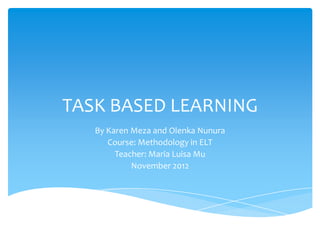
Task based karen y olenka final final
- 1. TASK BASED LEARNING By Karen Meza and Olenka Nunura Course: Methodology in ELT Teacher: Maria Luisa Mu November 2012
- 2. CONTENT 1. What is task-based learning and teaching? 2. Theory of language 3. Theory of language learning. 4. Syllabus Types of tasks 5. Teacher’s role 6. Learner’s role 7. Material 8. Assessment
- 3. What is Task Based Learning? Task-based learning (TBL) is an approach to second/foreign language (L2)learning and teaching and a teaching methodology in which classroom tasks constitute the main focus of instruction. (R. Richards, Schmidt, Platt, & Schmidt, 2003)
- 4. What is a ‘Classroom Task’? A classroom task is defined as an activity that: a) is goal-oriented, b) is content focused, c) has a real outcome, and d) reflects real-life language use and language need (Shehadeh, 2005)
- 5. Theory of Language: Interactionist Theory Interactionists argue: That language development is both biological and social. That language learning is influenced by the desire of children to communicate with others. That children are born with a powerful brain that matures slowly and predisposes them to acquire new understandings that they are motivated to share with others" ( Bates,1993;Tomasello,1995, as cited in shaffer,et al.,2002,p.362).
- 6. Theory of Language: comments Language is It is not linked to a single primarily a means model of language but of making rather draws on all three meaning models of language theory: structural - (Skehan 1998:98). functional - interactional “Conversation” is the central focus of language and the keystone of Lexical units are language central in acquisition language use (Richards and Rodgers 2001)
- 7. Theory of Learning The main theorist associated with interactionist theory is Lev Vygotsky. Interactionists focus on Vygotsky's model of collaborative learning ( Shaffer,et al.,2002). SOCIO- CULTURAL: Collaborative learning is the idea that conversations with older people can help children both cognitively and linguistically ( Shaffer,et.al,2002).
- 8. Theory of Language: comments TBL provides both the input and the output processing necessary for language acquisition Task activity and achievement are motivational (Richards and Rodgers 2001).
- 9. The Syllabus The syllabus in TBL is organized around activities and tasks rather than in terms of grammar or vocabulary (R. Richards et al., 2003).
- 10. Types of Tasks 1. Listing Outcome: Completed list or draft mind map. 2. Sequencing Outcome: Set of information ordered and sorted according to specified criteria 3.Comparing Outcome:Could be items appropriately matched or assembled, or the identification of similarities and/or differences.
- 11. Types of Tasks 4. Problem solving Outcome: Solutions to the problem, which can then be evaluated. 5. Sharing personal experiences Outcome:Largely social. 6. Creative Tasks Outcome: End product which can be appreciated by a wider audience.
- 12. Role of teacher Selector and sequencer of tasks Coach: Preparing learners for tasks Monitor :Consciousness- raising
- 13. Learner’s role Group Participant: Many tasks will be done in pairs or small groups. Monitor: Students have the opportunity to notice how language is used in communication. Risk-taker and innovator: Many tasks will require learners to create and interpret messages for which they lack full linguistic resources and prior experience.
- 14. Material What are Authentic Materials? What is the importance of the use of authentic material?
- 15. Authentic Listening /Viewing Materials
- 18. ASSESSMENT AND Evaluation Students should know how their work will be assessed (rubrics, checklist, etc) After the task is done students evaluate the process they’ve been through as well as the outcome.
- 19. COMPONENTS OF THE TASK –BASED LEARNING FRAMEWORK: PROCEDURE Task Pre task cycle Language Focus
- 20. http://www.willis-elt.co.uk/books.html Task-Based Instruction in Foreign Language Education Practices and Programs - Betty Lou Leaver and Jane R. Willis, Editors http://www2.uni- wuppertal.de/FB4/anglistik/multhaup/methods_elt/8_task_ based_learning.htm# Task Based Learning (TBL)
- 26. Crookes, G. & Gass, S. (eds.) 1993, Tasks and Language Learning. Integrating Theory and Practice. Clevedon: Multilingual Matters. Crookes, G. & Gass, S. (eds.) 1993, Tasks in a Pedagogical Context. Integrating Theory and Practice. Clevedon: Multilingual Matters. Doughty, C. & Williams, J. (eds.), 1998, Focus on Form in Classroom Second Language Acquisition. Cambridge: University Press. Long, M. H. 1985, "A role for instruction in second language acquisition: Task-based language teaching." In: K.Hyltenstam & M.Pienemann (eds.), Modelling and Assessing Second Language Acquisition. 77-99. Long, M.H. 1998, “Focus on form: Theory, research, and practice”. In: Doughty, Catherine & William, Jessica 1998, ‚Issues and terminology’. In: Doughty, Catherine & William, Jessica (eds.) Focus on Form in Classroom Second Language Acquisition. Cambridge: Cambridge University Press: 15-41. Nunan, D. 1989, Designing Tasks for the Communicative Classroom. Cambridge: Cambridge University Press. Nunan, D. 1993, "Task-based syllabus design: Selecting, grading, and sequencing tasks." In: Crookes, G. & Gass, S. (eds.), Tasks and Language Learning. Integrating Theory and Practice. Clevedon: Multilingual Matters. p. 55-68. Prabhu, N. 1987, Second Language Pedagogy. Oxford: Oxford University Press. Puchta, H. & Schratz, M. 1984, Handelndes Lernen im Englischunterricht. 2 Bde. München: Hueber. Skehan, P. 1996, "A framework for the implementation of task-based instruction." Applied Linguistics 17 (1), p. 38-62. Skehan, P. 1998, “Task-based instruction.” Annual Review of Applied Linguistics 18, 268-286. Timm, J.-P. 1991, "Englischunterricht zwischen Handlungsorientierung und didaktischer Steuerung", Die Neueren Sprachen, 1: 46-65. Timm, J.-P. (ed.) 1995, Ganzheitlicher Fremdsprachenunterricht. Weinheim: Deutscher Studien Verlag. Willis, J. 1996, A Framework for Task-Based Learning. London: Longman.
